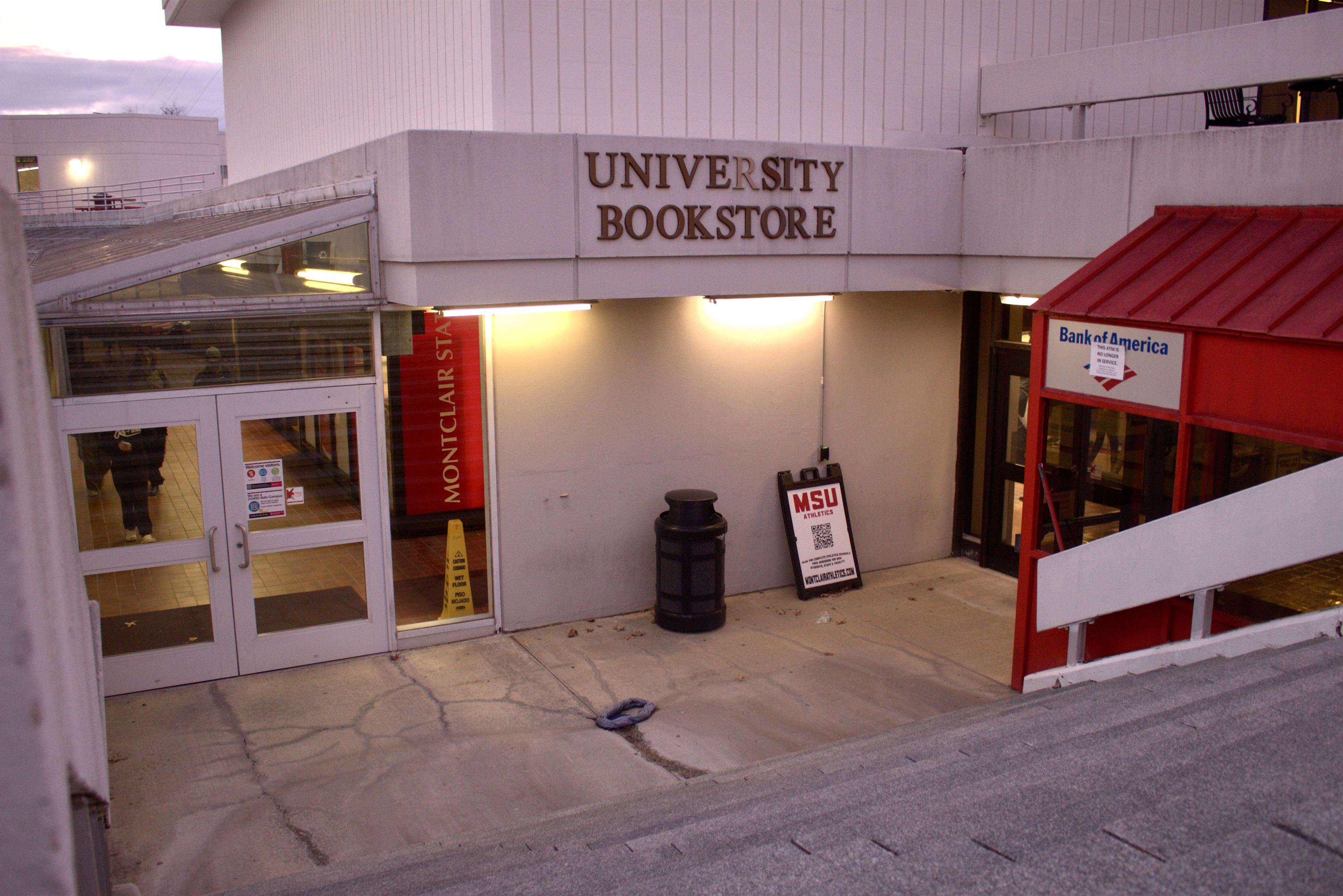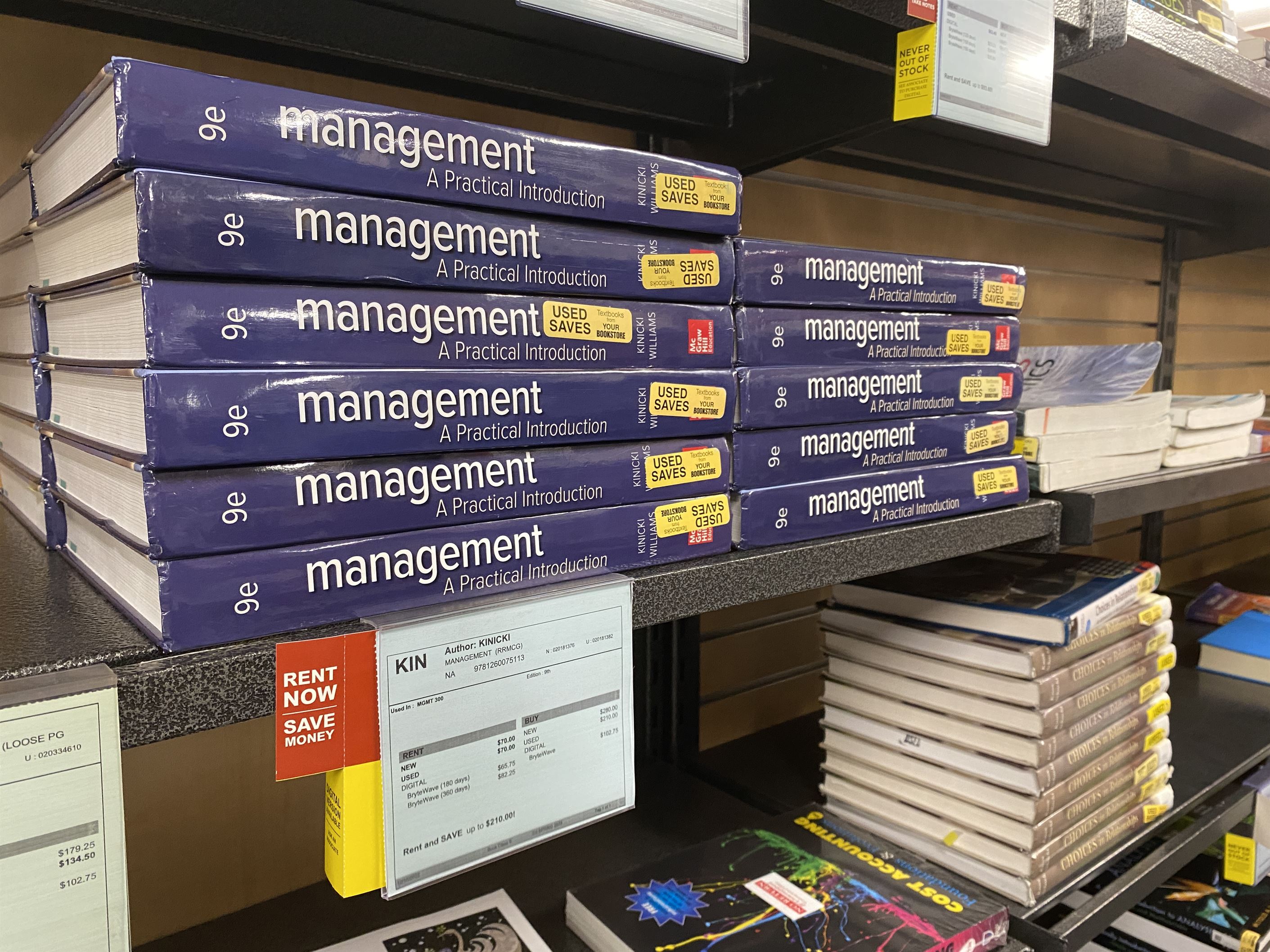With college starting up again and inflation on the rise, Montclair State University students are giving feedback on a longtime complaint: professors requiring them to purchase textbooks to do well and get credit for their courses.
According to Educationdata.org, the average college student spends between 600 and 1,400 dollars annually for textbooks and supplies alone. That’s in addition to the almost 14,000 dollars they are paying in tuition and fees per year. However, some professors have been reluctant to require such material for their students, much to students’ delight.

Students can spend up to $1,400 on textbooks and supplies per year at the university bookstore.
Sal DiMaggio | The Montclarion
For many students, buying a textbook may seem like a nuance to purchase to take an already expensive class, depending on its length, price and use of it during their courses. Educationdata.org also reports that college textbooks increase in price by 12 percent as they grow into their next edition.
Bobby Dante, a senior television and digital media major, gave insight into purchasing his required textbooks and their prices.
“Just this past week, I purchased three textbooks and they came out combined to be over 100 dollars,” Dante said. “I also went to the bookstore and bought one which was 22 dollars and change, and another one on Amazon which was over 60 dollars, a little too pricy for a textbook, but it was for my major so I did not have much of an issue with that.”
Dante also described his process for determining which textbooks will be necessary for the future based on the classes he enrolls in.
“Some of the general education classes in the past I’ve spent money on for textbooks and I thought [it] was excessive, so I always tried to rent them for cheaper prices because I really didn’t need them after that,” Dante said. “For the most part, I think the textbooks are moderately priced except, for a few here and there, anything within the 20 or 30 dollar range is pretty affordable to me.”

Bobby Dante, a senior television and digital media major, pays strict attention to the various options to buy or rent textbooks for his courses. Aidan Ivers | The Montclarion
Nicole Passero, a freshman hospitality, sports, events and tourism major, explained how the requirements of textbooks impacted her initial semester at Montclair State.
“It was definitely an experience,” Passero said. “This past fall was my first semester of college and I had to buy five textbooks for my classes. I tried going on the cheaper side by renting books at the bookstore or through Amazon, which worked pretty well.”

Nicole Passero, a freshman hospitality, sports, events and tourism major, said it's a waste of money to buy textbooks and not use them during the semester.
Aidan Ivers | The Montclarion
Passero also shared how professors need to make use of their students’ purchases for a smooth-running course.
“For some classes, professors made us buy books and we did use them, but I didn’t like it when a professor said to buy a textbook and we never used it because it was a waste of money,” Passero said. “It brings up the question, ‘If you’re telling us to get the textbook otherwise we aren’t going to pass the class, why would we hardly use it throughout the semester?’ There’s no point in that.”
Brianna Badolato, a sophomore psychology major, also explained the expensive process of buying textbooks.
“I personally think some of the prices of the textbooks are outrageous, especially for psychology which can be well over 100 dollars,” Badolato said. “I still have books from classes I never really opened or frequently used for my electives. We’re already spending upwards of 13,000 dollars to take these classes, and [to] not include textbooks is frustrating.”

Brianna Badolato, a sophomore psychology major, explained the different requirements for her courses which can quickly rise in dollar value. Photo courtesy of Karsten Englander
Badolato also brought up other course requirements for her other classes.
“I’m taking an American Sign Language course, and we have to use this specific program where one option is 25 dollars and the other is 15 dollars to use, and there is also a membership option for 40 dollars but that’s on top of buying textbooks and being enrolled as a full-time student, it’s just a lot of money,” Badolato said.
Joel Penney, an associate professor at the School of Communication and Media, spoke about what goes into constructing courses from semester to semester and requiring material for them.
“Like most professors, we definitely are very focused on quality readings and having our students engage in those readings,” Penney said. “I do pay attention to the costs, some are more pricey than others, and it’s definitely something we have to keep in mind. In many cases, we have to have the students buy the book and engage in the in-depth readings.”

Dr. Joel Penney is an associate professor at the School of Communication and Media.
Aidan Ivers | The Montclarion
Penney did note that there are some exceptions to this, depending on what direction the professor decides to take for their course.
“Last semester, I actually assigned a free online textbook and the reason for that was it was the textbook I felt would be best for the class from the most updated and relevant information,” Penney said. “If it was in a format where they had to pay, it might have been worth it even with a cost consciousness.”
Penney also explained his process for incorporating his published work into his courses.
“This semester, I am teaching a senior seminar course on the topic of the instructor’s expertise so that’s why I’m focusing on what I’ve done research on,” Penney said. “I know there’s sometimes concerns with professors assigning their own books to their students as a way to get royalty money.”
But Penney explained why students shouldn’t be worried about that due to a New Jersey state law.
“We are a public university, and under the state of New Jersey, if a professor assigns their own book to their own students, all royalties they collect from that have to be donated to charity, and they cannot profit off of that,” Penny said. “That’s actually an ethical regulation in response to concerns that have been raised before. Rather than go through the accounting issues of getting the royalties donated, I just put my research together as PDFs to make it logistically easier and to be mindful of costs adding up.”



